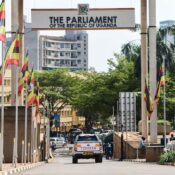
Amid tensions with South Korea, North Korea claims that 1.4 million people intend to enlist in the army
North Korean state media reported on Wednesday that approximately 1.4 million youths had registered to enlist in or rejoin the army this week, accusing Seoul of causing the “tense situation to the brink of war” with a provocative drone incursion.
The heated rhetoric follows North Korea’s accusation last week that Seoul had flown drones over Pyongyang, dispersing a “huge number” of anti-North leaflets. The North then said that the South would “pay a dear price” on Tuesday after blowing up inter-Korean roads and rail links on its side of the border.
According to the official KCNA news agency, the young people were adamant about fighting in a “sacred war of destroying the enemy with the arms of the revolution,” included students and youth league officials who had signed petitions to enlist in the army.
“The ROK will disappear from the map in the event of a conflict. Using the initials of the South’s official name, the Republic of Korea, the KCNA report stated, “We are willing to put an end to its existence because it wants a war.”
Although it is challenging to confirm such assertions from the reclusive state, North Korea has previously made similar claims about young people rushing to enlist during a period of heightened tensions.
800,000 of its inhabitants volunteered to join the North’s military to fight against the United States, according to a report published by official media last year. Nearly 3.5 million workers, party members, and soldiers volunteered to serve in 2017, it added.
North Korea has 1.28 million active military and roughly 600,000 reservists, including 5.7 million Worker/Peasant Red Guard reservists among numerous unarmed formations, according to data from the International Institute for Strategic Studies (IISS).
The defense ministry in Seoul has not responded to the most recent KCNA report, but it has issued a warning that if North Korea threatens South Koreans’ safety, that day will mark “the end of its regime.”
At a news conference later on Wednesday following negotiations in Seoul, the vice foreign ministers of South Korea, the US, and Japan vehemently denounced the North for “intentionally raising tension” by claiming the drone intrusion and closing the southern border.
North Korea has long been accused by Western nations of supplying Russia with weaponry to aid in the conflict in Ukraine. Ukrainian President Volodymyr Zelenskiy declared on Wednesday that the North was deploying troops as well, thereby joining the conflict.
When asked about that matter, U.S. Deputy Secretary of State Kurt Campbell stated that Washington was still reviewing the claims but that there were indications of increased material support for Russia from the North “which is being felt on the battlefield.”
After China and Russia blocked a U.N. mechanism earlier in the day, the three leaders launched a new 11-nation panel to oversee the implementation of sanctions against the North.
TENSION FLARE-UP
By inflaming and increasing hostility against the South, Pyongyang may be attempting to strengthen people’s unity and create the rationale for a provocation, according to a representative at Seoul’s unification ministry that handles inter-Korean issues.
According to the official, North Korean leader Kim Jong Un also appeared to be under public pressure due to economic difficulties.
According to Park Won-gon, a professor at Seoul’s Ewha Womans University, North Korea seems to be using the drone incident to mobilize opposition to the South as part of its efforts to cut off cross-border relations and advance a “two-state” system.
“If you look at the interviews that keep appearing in state media, there are very harsh words toward the South, and that’s their typical public mobilization propaganda,” he stated.
Following Kim’s declaration that unification was no longer feasible and that South Korea was a “primary foe” early this year, the North has been acting to sever ties between the two Koreas.
Although the 1950–53 conflict between the two Koreas concluded with an armistice rather than a peace treaty, they are still formally at war.
All Categories
Recent Posts
Tags
+13162306000
zoneyetu@yahoo.com



